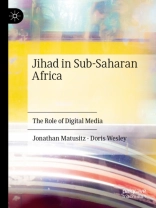This book examines how jihadist groups in sub-Saharan Africa have managed to advance their extremist agenda and recruit new followers thanks to digital media fueled by the information revolution since the dawn of the 21st century. This examination is based on a mixture of historical accounts, contemporary descriptions, case studies, theoretical applications, and an in-depth applied study (in the late chapters of the manuscript). An important conclusion is that the progress of jihadism in sub-Saharan Africa has been commensurate with the development and availability of digital media. This book breaks new ground in three ways. It is the first major academic work to devote most of its content exclusively to the use of digital media by jihadist groups in that region. Examples of jihadist digital media include social networking sites, online instructional videos, propaganda videos, and online jihadist magazines―among others. Secondly, it provides detailed case studies of both well-known African groups (e.g., Al-Shabaab, Boko Haram) and lesser-known ones― e.g., the Allied Democratic Forces in the Congo (which have, nevertheless, wreaked so much damage). Lastly, it is the first book to include an in-depth thematic analysis of online jihadist magazines―Inspire, Dabiq, Rumiyah, and Gaidi Mtaani―on their content dedicated to sub-Saharan Africa.
Table of Content
1: Introduction.- 2. Sub-Saharan Africa.- 3. Transnational Networks in Sub-Saharan Africa.- 4. Digital Media.- 5. Jihad and Digital Media in Sub-Saharan Africa.- 6. Case Study–Al-Shabaab’s Digital Media.- 7. Case Study–Boko Haram’s Digital Media.- 8. Case Study–The ADF’s Digital Media.- 9. Online Jihadist Magazines.- 10. Thematic Analysis of Online Jihadist Magazines.- 11. Discussion, Theoretical Implications, and Solutions.
About the author
Jonathan Matusitz, Ph.D., is currently an associate professor in the Nicholson School of Communication and Media at the University of Central Florida. He is author of many scholarly books, including Global Jihad in Muslim and non-Muslim Contexts (Palgrave Macmillan, 2020), and From Child Terrorism to Peace Activism (Springer, 2022).
Doris Wesley, M.A., is currently a researcher and doctoral fellow in the Communication, Rhetoric, and Digital Media program at North Carolina State University. She has published peer-reviewed articles in journals such as the International Gender Research, the Journal of Communication and Media Research, the Western Journal of Communication, and Mobilities.












